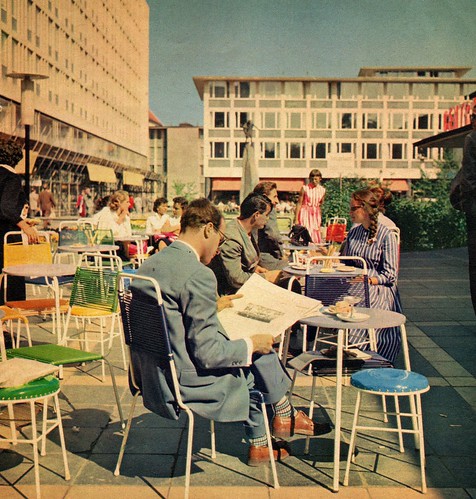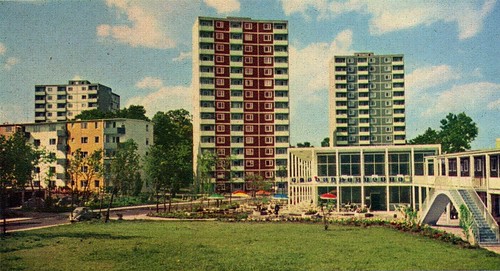
High Modernism is summed up quite efficiently in these three photographs. The sharkskin suits (mind the socks!), the playful, pastel-colored furniture, and the Bauhaus[esque] architecture, born of the soft Marxism of Gropius. As Tom Wolfe told it:
Gropius was chairman of the Novembergruppe's Arbeitsrat für Kunst (Working Council of Art), which sought to bring all the arts together "under the wing of a great archtechture," which would be "the business of the entire people." As everyone understood in 1919, the entire people was synonymous with the workers. "The intellectual bourgeois... has proved himself unfit to be the bearer of a German culture," said Gropius. "New, intellectually underdeveloped levels of our people are rising from the depths. They are our chief hope." Gropius' interest in "the proletariat" or "socialism" turned out to be no more than aesthetic and fashionable, somewhat like the interest of President Rafael Trujillo of the Dominican Rebublic or Chairman Mao of the People's Republic of China in republicanism.
Wolfe then goes on to describe how, without any change in the social structure of the business of architecture, the term 'bourgeois' became just an all purpose insult for any style those who actually employ architects liked which the disciples of the Modern school did not. As such, during the High Modernist period we see the blending of "American" individualist values with the more Continental values of community and social justice. Here the notions of bourgeois comfort, already in their industrialized stages in America, coexist with European social democracy (evidenced by an adoption of their housing solutions) which at the time was seen as a sort of middle ground between the false narratives of the Cold War.

In both Europe and North America, the leisure industry was at it height. Air travel, hospitality and other related industries were booming. Relaxed moral codes combined with a sense of style made traveling, vacationing and general non-labor always seem as if it was on the verge of a raucous good time. Sexual mores were becoming more liberal yet not wholly commodified, as they would be in the Late Modern era. This era of sexual awakening before the sterile overexposure that politicized 'liberation' would bring (along with Feminist/Maoist puritanicalness) when combined with the acceptability of drinking during the day made for a generally enjoyable leisure atmosphere for most 'regular' folks.

Of course, the liberal preoccupation with niceties, comfort and safety, elevated to the point of being principles in and of themselves, would be a key ingredient to the downfall of Occidental culture. As Ernst Jünger wrote:
the securing of life against late, that great mother of danger, appears as the truly bourgeois problem, which is then made subject to the most diverse economic or humanitarian solutions. All formulations of questions at present, whether aesthetic, scientific, or political in nature, move in the direction of the claim that conflict is avoidable. Should conflict nevertheless arise, as cannot, for example, be overlooked in regard to the permanent tact of war or criminality, then all depends upon proving it to be an error whose repetition is to be avoided through education or enlightenment.
Now managerial mediocrity, matching furniture and the ability to talk about non-whites in a charitably patronizing tone are seen as the authenic expressions of contemporary Westerners. Think about the party scene in Breakfast at Tiffany's, when was the last time anyone saw people that age having that good of a time and be that well dressed while doing it? Now so called professionals stand around awkwardly and discuss their diets and psychiatric appointments. If you want something more raw and primal, how about a good ol' fashion Bacchanalian bonfire in the woods with all your mates and some birds? This taps into our heathen heritage and is fueled by a desire to shake off the shackles of school or work-a-day repetition, booze, and possibly some smokable plants. We all know this occurs in every suburban or rural town in the USA, but the point has been lost and has thus become an endless and futile search for the right level of "fucked up." As such, the means (general euphoria for not being at work/school, booze, weed, possibility of getting laid) becomes the aim rather than the desired outcome: an authentic good time within an authentic human community.

